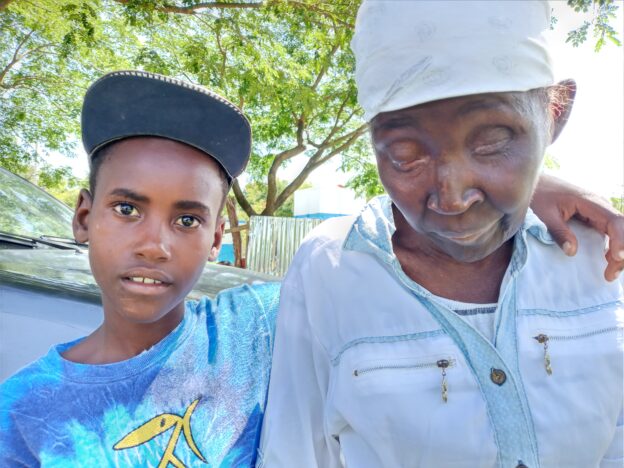Jonise graduated from the CLM program yesterday. She is a single mother of an eleven-year-old boy. The two share a home with some of her nieces and nephews. The other children only sleep with them, though. They go to their nearby home to spend their days. Their own parents support them. Jonise only has Kedji to support.
And she works hard to take care of him, though the care is mutual. Jonise was born without sight, and Kedji is her guide. He leads her anywhere she needs to go. And her impaired vision is not her only physical problem. She was born with severely malformed hands. Without palms to speak of, a single finger extends directly from each wrist. Her feet are misshapen, too, though she walks without difficulty.
Before she joined the program, she lived principally from charity. She would stroll through her neighborhood, and friends and neighbors would give her small gifts. She says, however, that on days when no one gave her anything, she and Kedji just wouldn’t eat. That’s what Kedji remembers most about their life before CLM, too. “Sometimes we had to go to bed without supper.”
Occasional hunger is not, however, what Jonise lists as the biggest problem she used to have. She didn’t have a latrine, so finding someplace to defecate was a constant source of shame. “CLM helped me build a latrine, so I don’t bother my neighbors anymore.”
She chose goats and a pig as her two enterprises, and her goats flourished. Kedji does a lot of the work taking care of them, but Jonise has to keep after him. “He helps I lot, but he’s a child. If I don’t tell him, he will forget to move them out of the sun. Sometimes I just move them myself.” Unlike most CLM members, she already had a goat when she joined the program, and the program gave her two more. But by the time graduation was drawing near, her three goats had become ten. She would have had more, but one of her goats died. “It was pregnant, too, almost ready to give birth.”
Her luck with pigs was much worse. CLM gave her a first pig, but it died, so the program helped her replace it. When the second pig died as well, she decided that pig-raising wasn’t for her. So she took what she could make by selling the meat, added savings from her weekly stipend, and sold three of her ten goats. She used the money to buy a small heifer. She likes having a cow. “If we take care of it, it will give me a calf, and then maybe we can use it to buy land, too.”
She hopes to use her goats to buy another cow soon, and could do so already if she wanted to. But keeping goats is important too. “Goats are important because I can sell one if we have a problem. And I won’t need charity to send Kedji to school anymore. I can sell a goat to buy him whatever he needs.”
As successful as she’s been with her goats, they don’t provide a daily income. At first, she established a small commerce. A larger merchant sold her rice and a few other groceries on credit. She’d pay when she sold out, and then she’d take credit for another purchase. The business brought in enough for her to feed herself and Kedji and also to make weekly deposits into her Village Savings and Loan Association. But it became difficult to manage. She sold out of her home, and merchants who sell staples like rice out of their homes are under constant pressure to sell on credit. Neighbors can be slow to pay, however, so Jonise sometimes had trouble paying her debt as well. Eventually she had to take out a loan from her VSLA to pay what she owed. She was able to repay that loan on time, but she decided not to run a business on credit anymore. “I want to go back into business soon, but I’ll wait until I can do it with my own money.”
She could have the chance to do so by early June. Her VSLA’s one-year cycle will end then, and she will receive all she’s saved along with her share of the interest the association has earned through its loans. She may use that money to go back into business, but she’s not sure. She thinks her pay-out will be over 10,000 gourds. She smiles shyly when she explains that she’d really like to buy another cow. But 10,000 gourds won’t be enough, and she’ll have to see whether it makes sense to sell enough goats to make up the difference.
